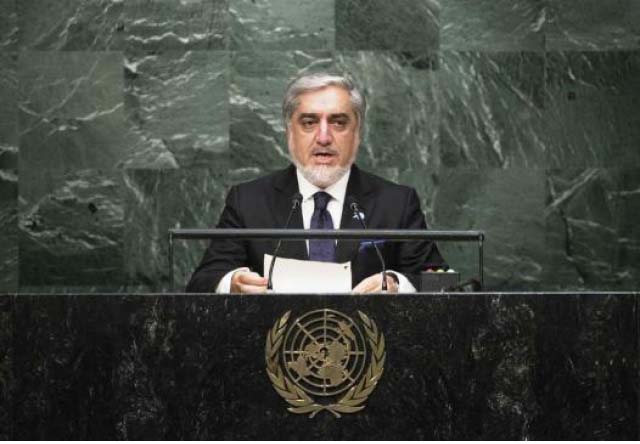KABUL - Chief Executive Officer Abdullah Abdullah on Tuesday said the presence of terrorist sanctuaries and support networks in Pakistan continued to cause trouble inside Afghanistan.
Speaking at the 70th United Nations General Assembly meeting in New York, Abdullah said the Haqqani network had been identified as a main culprit and needed to be dismantled as had been Afghanistan demand in the past.
“Our demands are legitimate as our people continue to suffer at the hands of terrorist elements who cross into Afghanistan and indiscriminately victimize our citizens. This matter needs can be addressed and facilitated by trusted international partners.”
As a case in point, he said, over the past 48 hours, hundreds of militants, including foreign fighters, organised attacks in Kunduz province, where heavy fighting was raging. The attacks came a day after more than 10 spectators at a sports match were killed and many more injured in southeastern Paktika province in a bomb attack, Abdullah said.
“These attempts will eventually fail to subdue us, as they have on other occasions over the past few years. In the larger context, Afghanistan continues to be the victim of terrorist organizations and violent extremists, including Daesh (ISIL) type cells trying to find a foothold.”
He said the guerrilla style low-intensity warfare would have been history by now. “We call on Pakistan to do what its leadership promised to us a few months ago when they agreed to crack down on known terror outfits - meaning the enemies of Afghanistan.”
He said they agreed to a paradigm change in their relations and engagement towards peace talks with the Taliban. Events turned out differently after it was divulged that the Taliban leader had been dead for over two years and the episode was a sham, he said.
“A loss of trust can have irreparable consequences for all sides. We need to learn from that. We also call on regional stakeholders and our international partners to realise the gravity of the situation, and use their good offices or any effective means to support our aspirations for a genuine and durable confidence-building process leading to talks with willing Taliban and other armed opposition groups.”
He said the Afghans had reached the one year mark for the anniversary of the national unity government and he was delighted to report to the UN assembly that Afghanistan had achieved significant milestones in the past year.
“Thanks to the exemplary generosity of our friends, progress made in Afghanistan over the last 14 years cannot be discounted. We succeeded in prioritising the needs of the most vulnerable, improve living standards, provide access to education to boys and girls, and improve healthcare quality.”
He said life expectancy in Afghanistan had increased by an average of 20 years since 2001, with Afghans living well beyond the mere 40 years of age that had once been their norm.
“Improvements in the health of women and children are particularly notable, as illustrated by the 54 percent increase in the number of infants delivered, and the decrease of infant mortality by 62 percent.”
He said through the focus on gender equality, equity, and equal opportunity adapted by the government, female political participation had also been strengthened.
During the 2014 election, he said, voters comprised of 35 percent females. “Women now claim 11 percent of judgeships, with an additional 20 percent in training.”
He said the Afghan government was strengthening laws and regulations dealing with torture and was taking necessary measures to prevent and prosecute individuals involved in any form of torture per the Optional Protocol to the Convention Against Torture.
Abdullah said the recently escalating security issues had slowed down state building and overall progress. “But our national security forces, through their patriotism and resilience have demonstrated that they are ready to face the challenges posed by the Taliban and other terrorist and violent extremist groups.”
He said he and President Ghani had prioritised a comprehensive reform agenda to root out corruption from the Afghan society and institutions and to promote transparency and efficacy at all levels of government, the judiciary and at the national and sub-national levels.
In addition to security challenges, he said, the menace of the illicit drug trade in Afghanistan was having an adverse impact on the economy and society.
However, he said they had a new comprehensive action plan to combat the drug economy more effectively.
“We are determined to meet the 10-year long goal of defeating narcotics once and for all. Regional cooperation on the drug problem is another key pillar of our strategy.” (Pajhwok)

